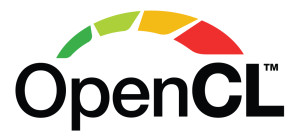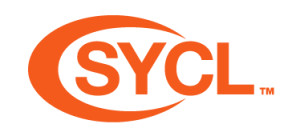Giacomo Balma, Sr. FX Technical Artist at MPC, has created a position-based particle orientation dynamics algorithm that computes the orientation of a particle by considering the change in position of its local neighbors. It is fully implemented in OpenCL for Houdini SideFX Software DOPs and adds very little overhead to the simulation. Learn more and watch a video of it in action.
Opencl tagged news
Khronos Group Releases OpenCL 3.0.17
The Khronos OpenCL Working Group is happy to announce the release of the OpenCL v3.0.17. This maintenance update addresses numerous bug fixes and clarifications, and delivers important improvements across several areas:
- Enhancements and corrections to the cl_khr_external_memory and cl_khr_external_semaphore extensions, informed by additional implementation experience and testing.
- Additions of support for importing NT handles by name to the cl_khr_external_memory and cl_khr_external_semaphores extensions for Windows.
- Usability improvements for the provisional cl_khr_command_buffer_mutable_dispatch extension, enabling update configurations to be passed as arrays rather than linked lists.
The latest specifications are available at the Khronos OpenCL Registry.
Qualcomm Blog: VCL - a New Open Source VirtIO-GPU OpenCL Driver Leveraging Hardware Acceleration
If you are developing, testing, or using OpenCL applications, you are likely aiming to harness the power of heterogeneous computing. OpenCL enables the acceleration of general-purpose workloads by executing them on the GPU, but what about workloads within a virtual machine? Is it possible to leverage OpenCL to accelerate those workloads on the physical GPU? And how would one achieve this?
This blog post examines VirtIO-GPU, a VirtIO-based graphics adapter, and VCL, an OpenCL driver by Qualcomm Technologies, Inc. for VirtIO-GPU. Using VCL, you can leverage the host’s graphics hardware to speed up OpenCL applications in guest virtual machines.
Intel Updates OpenCL Intercept Layer With New Abilities
Intel’s OpenCL Intercept Layer 3.0.4 is now available to assist in OpenCL debugging and performance profiling across Windows, Linux, macOS, Android, and FreeBSD. The release has overhead reduction work to yield better performance during tracing and profiling, many general improvements to tracing and logging, kernel capture and replay support, more support for Chrome tracing, and a variety of other new abilities. Those developing with OpenCL and wishing to check out Intel’s intercept layer for debugging and performance profiling can find the Intel’s OpenCL Intercept Layer available on GitHub.
Khronos Group Releases OpenCL 3.0.16
The OpenCL Working Group has released v3.0.16 of the OpenCL specifications, the sixteenth OpenCL 3.0 maintenance update. This is a significant update that integrates the standard Khronos KHR extension specifications into the core specification, making it easier for users and implementers to understand how extensions interact with core OpenCL functionality.
In addition, this update added the provisional cl_khr_kernel_clock extension, which adds new built-in functions to profile a kernel executing on an OpenCL device. It also includes final versions of the cl_khr_semaphore, cl_khr_external_semaphore, and cl_khr_external memory extensions, enabling efficient interoperability with other APIs.
The latest specifications can be found on the Khronos OpenCL registry: https://registry.khronos.org/OpenCL/
Khronos Group Working with Trail of Bits for Increased API Security
Khronos welcomes the work by Tyler Sorensen and Trail of Bits to increase security around the usage of Khronos APIs and have been working closely with them for several months to ensure that API implementers are aware and able to act on any issues. Khronos is also diligently exploring additional actions relating to API specifications, conformance testing, and platform vendor cooperation to continually strengthen safety and security when using Khronos compute and rendering APIs.
PoCL 5.0 Released With Transparent OpenCL Over Networked Systems Capability
PoCL-Remote is the new code in PoCL 5.0 that allows for OpenCL to be transparently used across networked systems. Permitting OpenCL support on the other networked systems, PoCL-Remote allows seamlessly using OpenCL on those remote hosts. This PoCL-Remote handling is done over TCP/IP but there is no encryption/authentication so it's just intended for LAN uses. The performance also may not be all that great depending upon how latency sensitive your OpenCL application is and other possible performance bottlenecks.
Khronos Group Releases OpenCL 3.0.15
This week, the Khronos OpenCL working group released revision 15 of the OpenCL 3.0 Specifications. This release includes the usual clarifications and corrections, plus several additions and refinements to the provisional extensions for command buffers and external memory interop, many based on feedback from the community. The latest specifications may be downloaded from the OpenCL registry.
AdaptiveCPP 23.10.0 Released with New Single-Pass SYCL Compiler
AdaptiveCpp 23.10.0 released! New project name, world’s first single-pass SYCL compiler, C++ standard parallelism, production Intel GPU support, OpenCL backend and more! A huge shift in the project’s capabilities.
New PoCL-Remote Backend Enables Distributed Computing with Pure OpenCL - No MPI Needed
The PoCL open-source OpenCL implementation from Tampere University now has a new PoCL-Remote backend that enables transparent offloading of OpenCL tasks across nodes on a network, enabling distributing computing without using MPI or similar APIs. Since PoCL-Remote uses standard OpenCL API calls, acceleration offload can be performed identically whether using local or remote devices, for seamless selective/adaptive edge offloading and other use cases.
PoCL 4.0 OpenCL Implementation Released With Intel oneAPI Level Zero Driver
PoCL 4.0 is out as the latest major update introducing an experimental Intel oneAPI Level Zero driver for using this OpenCL stack on Intel graphics processors. In addition, PoCL now supports Clang/LLVM from 10.0 to 16.0 inclusive. The most PoCL-relevant change of the new 16.0 release is support for _Float16 type on x86 and ARM targets. Plus there is MacOS X support, new testsuites, bug fixes, and more...
WP2 webinar: OpenCL OpenCL GPU Programming for HPC Applications
ChEESE (Centre of Excellence (CoE) for Exascale in Solid Earth) is hosting a two-hour workshop to introduce OpenCL and highlight the significant benefits that OpenCL offers over other proprietary languages, in particular it’s excellent compatibility across all GPU hardware since 2009. Following, there will be a brief case study, and will conclude with an open discussion. The webinar will take place 28 June starting at 10:00am CEST.
Mesa Matrix Tracker Now Tracks OpenCL
Mesa Matrix tracker has long shown Vulkan and OpenGL versions and extensions supported by the different open-source drivers. Now, it has begun reporting OpenCL support.
Khronos Group Release OpenCL 3.0.14 Update
Khronos has today released the OpenCL 3.0.14 maintenance update that introduces a new cl_khr_command_buffer_multi_device provisional extension that enables execution of a heterogeneous command-buffers across multiple devices. This release also includes significant improvements to the OpenCL C++ Bindings, a new code generation framework for the OpenCL extension headers, and the usual clarifications and bug fixes. The new specifications can be downloaded from the OpenCL Registry.





 The agenda for IWOCL & SYCLcon 2023 has been announced! This premier event dedicated to developers using the OpenCL and SYCL APIs will take place in beautiful Cambridge, UK on April 18-20, 2023. It is a unique technical event bringing the developer community together to exchange ideas, solve problems and help steer the future development of the OpenCL and SYCL ecosystems. Early bird pricing is available until the end of March.
The agenda for IWOCL & SYCLcon 2023 has been announced! This premier event dedicated to developers using the OpenCL and SYCL APIs will take place in beautiful Cambridge, UK on April 18-20, 2023. It is a unique technical event bringing the developer community together to exchange ideas, solve problems and help steer the future development of the OpenCL and SYCL ecosystems. Early bird pricing is available until the end of March.